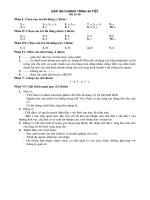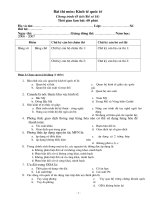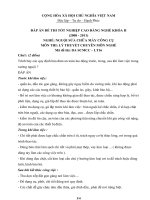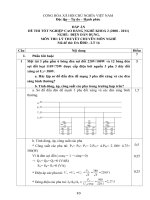PASSAGE 16
Bạn đang xem bản rút gọn của tài liệu. Xem và tải ngay bản đầy đủ của tài liệu tại đây (40.92 KB, 3 trang )
PASSAGE 16
UNICEF means? United Nations Children's Fund. It serves children in communities all the the world. It
helps children of all races, nationalities, religions, and political systems in more than 140 developing
countries.
UNICEF, created in 1946 to help bring food and medicine to children who suffered during World War II
in Europe. It began as a temporary agency, but became a permanent part of the United Nations in 1953
due to the need for its services around the world. UNICEF's primary concern is to help governments of
developing countries improve the quality of life for almost one billion children. UNICEF's main office is
in the United Nations offices in New York City, but it. also has more than 40 offices and 100 programs
worldwide. In 1965, UNICEF won the Nobel Peace Prize for its work helping children and building
brighter futures.
UNICEF works with governments to provide three kinds of services. First, UNICEF plans and develops
programs in developing countries. These programs serve the community by providing health care,
information about nutrition, basic education, and safe water and sanitation. Then UNICEF trains people to
work in these programs. UNICEF also provides supplies and equipment that enable the programs to work.
UNICEF's greatest concern is to improve the health of children. It does this in several ways. It improves
water supplies in undeveloped countries where the water is not clean enough to drink. When children
drink unclear water, they become very sick, and many die. UNICEF works hard to correct this. It also
provides food and teaches people what to feed their children so they grow up to be healthy. UNICEF
provides immunizations for children to prevent serious diseases. It gives important vitamins, such as
vitamin A, to children who could go blind because of a lack of it . It also helps disabled children
throughout the world. UNICEF helps train teachers and provides equipment and supplies for schools. By
teaching people to read and write, UNICEF helps people to improve their lives.
Question 1. What is the main idea of the passage?
A. The purpose of UNICEF's long- term assistance.
B. The history of UNICEF
C. The role of UNICEF in port-war Europe.
D. UNICEF programs in developing countries.
Question 2. Which of the following is not true?
A. UNICEF help to take care of the health and education of children.
B. UNICEF tries to help provide a better life for children.
C. UNICEF helps government of developed countries improve the quality of life for children.
D. UNICEF is a part of the United Nations
Question 3. In 1953 UNICEF became a permanent part of the United Nations because _______.
A. it completed its mission in post-war Europe
B. European children no longer needed its services
was long enough
D. it was felt that its services were needed around the world
Question 4. UNICEF's efforts were appreciated when it __________.
A. achieved the biggest sale of its greeting cards
B. received the greatest contributions from healthy people
C. opened more than 40 offices around the world
C. its temporary status
D. was awarded the Nobel Peace Price in 1965
Question 5. One of the three kinds of services on UNICEF involves _________
A. holding special events to collect money for its programs
B. training people to work in its various programs
C. selling supplies and equipment to schools in developing countries
D. sponsoring programs to prevent and treat serious diseases.
ĐÁP ÁN
1-A
2-C
3-D
4-D
5-B
LỜI GIẢI CHI TIẾT
Question 1:
Giải thích: UNICEF, created in 1946 to help bring food and medicine to children who suffered during
World War II in Europe. It began as a temporary agency, but became a permanent part of the United
Nations in 1953 due to the need for its services around the world
Dịch nghĩa: UNICEF, được thành lập vào năm 1946 để giúp mang thức ăn và thuốc men cho những đứa
trẻ phải chịu đựng trong suốt Thế chiến II tại châu Âu. Nó bắt đầu như là một cơ quan tạm thời, nhưng đã
trở thành một phần vĩnh viễn của Liên Hiệp Quốc năm 1953 do nhu cầu về dịch vụ của mình trên tồn thế
giới.
Question 2:
Giải thích: UNICEF's primary concern is to help governments of developing countries improve the
quality of life for almost one billion children.
Dịch nghĩa: mối quan tâm chính của UNICEF là để giúp chính phủ các nước đang phát triển cải thiện chất
lượng cuộc sống cho gần một tỷ trẻ em.
Question 3:
Giải thích: It began as a temporary agency, but became a permanent part of the United Nations in 1953
due to the need for its services around the world
Dịch nghĩa: . Nó bắt đầu như là một cơ quan tạm thời, nhưng đã trở thành một phần vĩnh viễn của Liên
Hiệp Quốc năm 1953 do nhu cầu về dịch vụ của mình trên tồn thế giới.
Question 4:
Giải thích: In 1965, UNICEF won the Nobel Peace Prize for its work helping children and building
brighter futures.
Dịch nghĩa: Năm 1965, UNICEF đã giành giải Nobel Hịa bình cho cơng việc của mình giúp trẻ em và
xây dựng tương lai tươi sáng hơn.
Question 5:
Giải thích: First, UNICEF plans and develops programs in developing countries. These programs serve
the community by providing health care, information about nutrition, basic education, and safe water and
sanitation. Then UNICEF trains people to work in these programs.
Dịch nghĩa: Đầu tiên, UNICEF kế hoạch và phát triển các chương trình ở các nước đang phát triển. Các
chương trình phục vụ cộng đồng bằng cách cung cấp dịch vụ chăm sóc y tế, thơng tin về dinh dưỡng, giáo
dục cơ bản, và nước sạch và vệ sinh môi trường.
BÀI DỊCH
Đầu tiên, UNICEF kế hoạch và phát triển các chương trình ở các nước đang phát triển. Các chương trình
phục vụ cộng đồng bằng cách cung cấp dịch vụ chăm sóc y tế, thơng tin về dinh dưỡng, giáo dục cơ bản,
và nước sạch và vệ sinh môi trường.
Dịch nghĩa: UNICEF nghĩa? Quỹ Nhi đồng Liên Hợp Quốc. Nó phục vụ trẻ em trong cộng đồng tất cả
các thế giới. Nó giúp đỡ trẻ em thuộc mọi chủng tộc, quốc tịch, tơn giáo, và hệ thống chính trị ở hơn 140
quốc gia đang phát triển.
UNICEF, được thành lập vào năm 1946 để giúp mang thức ăn và thuốc men cho những đứa trẻ phải chịu
đựng trong suốt Thế chiến II tại châu Âu. Nó bắt đầu như là một cơ quan tạm thời, nhưng đã trở thành
một phần vĩnh viễn của Liên Hiệp Quốc năm 1953 do nhu cầu về dịch vụ của mình trên tồn thế giới. mối
quan tâm chính của UNICEF là để giúp chính phủ các nước đang phát triển cải thiện chất lượng cuộc
sống cho gần một tỷ trẻ em. văn phịng chính của UNICEF là trong các văn phòng Liên Hợp Quốc tại
thành phố New York, nhưng nó. cũng đã có hơn 40 văn phịng và 100 chương trình trên tồn thế giới.
Năm 1965, UNICEF đã giành giải Nobel Hịa bình cho cơng việc của mình giúp trẻ em và xây dựng
tương lai tươi sáng hơn.
UNICEF làm việc với các chính phủ để cung cấp ba loại dịch vụ. Đầu tiên, UNICEF kế hoạch và phát
triển các chương trình ở các nước đang phát triển. Các chương trình phục vụ cộng đồng bằng cách cung
cấp dịch vụ chăm sóc y tế, thơng tin về dinh dưỡng, giáo dục cơ bản, và nước sạch và vệ sinh mơi trường.
Sau đó, UNICEF đào tạo những người làm việc trong các chương trình này. UNICEF cũng cung cấp vật
tư và thiết bị cho phép các chương trình làm việc.
Mối quan tâm lớn nhất của UNICEF là cải thiện sức khỏe của trẻ em. Nó làm điều này bằng nhiều cách.
Nó cải thiện nguồn cung cấp nước ở các nước kém phát triển, nơi nước không đủ sạch để uống. Khi trẻ
uống nước không rõ ràng, chúng trở nên ốm yếu, và có thể chết. UNICEF làm việc chăm chỉ để sửa chữa
này. Nó cũng cung cấp lương thực và dạy người ta những gì để ni con cái mình để chúng lớn lên để
được khỏe mạnh. UNICEF cung cấp chủng ngừa cho trẻ em để phòng ngừa các bệnh nghiêm trọng. Nó
cung cấp cho các vitamin quan trọng như vitamin A, đến những người bị mù vì thiếu nó. Nó cũng giúp trẻ
em khuyết tật trên tồn thế giới. UNICEF giúp giáo viên đào tạo và cung cấp thiết bị và vật tư cho các
trường học. Bằng cách dạy cho mọi người đọc và viết, UNICEF giúp người dân cải thiện cuộc sống của
họ.









